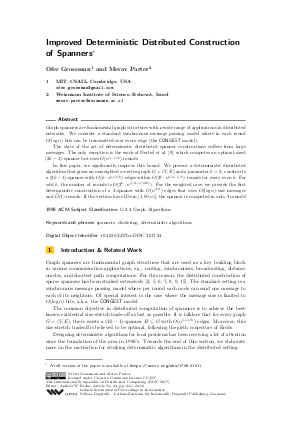Improved Deterministic Distributed Construction of Spanners
Authors Ofer Grossman, Merav Parter
-
Part of:
Volume:
31st International Symposium on Distributed Computing (DISC 2017)
Part of: Series: Leibniz International Proceedings in Informatics (LIPIcs)
Part of: Conference: International Symposium on Distributed Computing (DISC) - License:
 Creative Commons Attribution 3.0 Unported license
Creative Commons Attribution 3.0 Unported license
- Publication Date: 2017-10-12
File

PDF
LIPIcs.DISC.2017.24.pdf
- Filesize: 0.59 MB
- 16 pages
Document Identifiers
Subject Classification
Keywords
- spanners
- clustering
- deterministic algorithms
- congest model
Metrics
- Access Statistics
-
Total Accesses (updated on a weekly basis)
0Document
0Metadata
Abstract
Graph spanners are fundamental graph structures with a wide range of applications in distributed networks. We consider a standard synchronous message passing model where in each round O(log n) bits can be transmitted over every edge (the CONGEST model). The state of the art of deterministic distributed spanner constructions suffers from large messages. The only exception is the work of Derbel et al., which computes an optimal-sized (2k-1)-spanner but uses O(n^(1-1/k)) rounds. In this paper, we significantly improve this bound. We present a deterministic distributed algorithm that given an unweighted n-vertex graph G = (V,E) and a parameter k > 2, constructs a (2k-1)-spanner with O(k n^(1+1/k)) edges within O(2^k n^(1/2 - 1/k)) rounds for every even k. For odd k, the number of rounds is O(2^k n^(1/2 - 1/(2k))). For the weighted case, we provide the first deterministic construction of a 3-spanner with O(n^(3/2)) edges that uses O(log n)-size messages and ~O(1) rounds. If the vertices have IDs in [1,Theta(n)], the spanner is computed in only 2 rounds!
Cite As Get BibTex
Ofer Grossman and Merav Parter. Improved Deterministic Distributed Construction of Spanners. In 31st International Symposium on Distributed Computing (DISC 2017). Leibniz International Proceedings in Informatics (LIPIcs), Volume 91, pp. 24:1-24:16, Schloss Dagstuhl – Leibniz-Zentrum für Informatik (2017)
https://doi.org/10.4230/LIPIcs.DISC.2017.24
BibTex
@InProceedings{grossman_et_al:LIPIcs.DISC.2017.24,
author = {Grossman, Ofer and Parter, Merav},
title = {{Improved Deterministic Distributed Construction of Spanners}},
booktitle = {31st International Symposium on Distributed Computing (DISC 2017)},
pages = {24:1--24:16},
series = {Leibniz International Proceedings in Informatics (LIPIcs)},
ISBN = {978-3-95977-053-8},
ISSN = {1868-8969},
year = {2017},
volume = {91},
editor = {Richa, Andr\'{e}a},
publisher = {Schloss Dagstuhl -- Leibniz-Zentrum f{\"u}r Informatik},
address = {Dagstuhl, Germany},
URL = {https://drops.dagstuhl.de/entities/document/10.4230/LIPIcs.DISC.2017.24},
URN = {urn:nbn:de:0030-drops-80085},
doi = {10.4230/LIPIcs.DISC.2017.24},
annote = {Keywords: spanners, clustering, deterministic algorithms, congest model}
}
Author Details
References
-
Leonid Barenboim, Michael Elkin, and Cyril Gavoille. A fast network-decomposition algorithm and its applications to constant-time distributed computation. TCS, 2016.

-
Surender Baswana and Sandeep Sen. A simple and linear time randomized algorithm for computing sparse spanners in weighted graphs. Random Structures & Algorithms, 30(4):532-563, 2007.

-
Keren Censor-Hillel, Merav Parter, and Gregory Schwartzman. Derandomizing local distributed algorithms under bandwidth restrictions. CoRR, abs/1608.01689, 2016.

-
Yi-Jun Chang, Tsvi Kopelowitz, and Seth Pettie. An exponential separation between randomized and deterministic complexity in the local model. In FOCS, 2016.

-
Bilel Derbel and Cyril Gavoille. Fast deterministic distributed algorithms for sparse spanners. Theoretical Computer Science, 2008.

-
Bilel Derbel, Cyril Gavoille, and David Peleg. Deterministic distributed construction of linear stretch spanners in polylogarithmic time. In DISC, pages 179-192. Springer, 2007.

-
Bilel Derbel, Cyril Gavoille, David Peleg, and Laurent Viennot. On the locality of distributed sparse spanner construction. In PODC, pages 273-282, 2008.

-
Bilel Derbel, Cyril Gavoille, David Peleg, and Laurent Viennot. Local computation of nearly additive spanners. In DISC, 2009.

-
Bilel Derbel, Mohamed Mosbah, and Akka Zemmari. Sublinear fully distributed partition with applications. Theory of Computing Systems, 47(2):368-404, 2010.

-
Manuela Fischer and Mohsen Ghaffari. Deterministic distributed matching: Simpler, faster, better. arXiv preprint arXiv:1703.00900, 2017.

-
Manuela Fischer, Mohsen Ghaffari, and Khun Fabian. Deterministic distributed edge-coloring via hypergraph maximal matching. arXiv preprint arXiv:1704.02767, 2017.

-
Ofer Grossman and Merav Pater. Improved deterministic distributed construction of spanners. arXiv preprint arXiv:1708.01011, 2017.

-
Michal Hanckowiak, Michal Karonski, and Alessandro Panconesi. On the distributed complexity of computing maximal matchings. SIDMA, 15(1):41-57, 2001.

-
David Peleg. Distributed Computing: A Locality-sensitive Approach. SIAM, 2000.

-
Seth Pettie. Distributed algorithms for ultrasparse spanners and linear size skeletons. Distributed Computing, 22(3):147-166, 2010.

